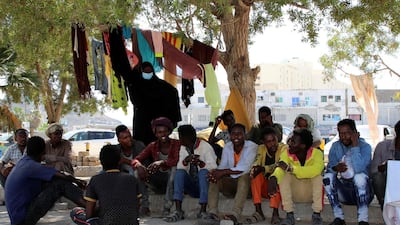More than 100 Ethiopian migrants in Yemen were repatriated this week by the International Organisation of Migration, weeks after a fire at an overcrowded detention centre in Sanaa killed at least 44.
Yemen's Houthi rebels are accused of causing the blaze on March 7 at the centre that held nearly 1,000 people, many from Ethiopia, who were trying to cross Yemen to find work in the Gulf countries.
"All the 140 migrants on the flight were Ethiopian and the passengers included four children [all boys, two of whom were babies] and nine women," Olivia Headon, IOM spokeswoman for Yemen, told The National on Wednesday.
“This flight is a vital lifeline for migrants who have been stranded for months on end in unsafe conditions,” said Antonio Vitorino, director general of IOM.
While none of those on Tuesday’s flight were at the Sanaa holding centre at the time of the fire, Ms Headon said many who were have started to arrive in Aden.
"We understand that many of those affected by the fire are starting to arrive in Aden, having been forcibly transferred from Sanaa to southern governorates," she said.
Ms Headon said the flight left Aden on Tuesday but other repatriations, carried out under the organisation's voluntary humanitarian return programme, had previously left from Sanaa and other cities.
It is the first repatriation to Ethiopia carried out since the start of the Covid-19 pandemic last year.
On Tuesday, Human Rights Watch issued a report that confirmed accounts by witnesses who spoke to The National that the fire was caused by Houthi forces guarding the detention centre.
A huge blaze engulfed a hangar-like building holding 350 of the 950 people at the centre after the rebel group fired projectiles at the building during a skirmish with detainees protesting against poor living conditions, HRW said. The IOM has not commented on the cause of the blaze.

A first projectile was launched from a roof, producing smoke. A second exploded loudly and started a fire, said HRW, which said it could not verify the projectile types. People outside the burning hangar helped break the walls and door to rescue people.
Survivors of the inferno who fled to Aden told The National that the Houthis rounded up thousands of migrants from streets in Sanaa, forcing them to either pay or join the rebel ranks on the front lines of the war.
"They forcibly detained me while I was working in a restaurant in Sanaa city," Radhwan Mohammed, a young Ethiopian migrant, told The National while taking part in a protest by the migrants in front of the UNHCR office in Aden last week.
"The Houthis told me that they would take me to the holding centre where they would take my fingerprints and let me go, but when I arrived, I found hundreds of fellow Oromo Ethiopians detained in the hangar," he said.
Mr Mohammed's account confirmed the HRW report that the Houthi soldiers fired projectiles after the detained migrants started a hunger strike protesting against the ill-treatment they faced while in Houthi detention.
The UN envoy for Yemen, Martin Griffiths, told the Security Council on Tuesday that the incident demanded an independent investigation into the cause of the fire that killed dozens of migrants and injured more than 170.

